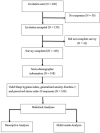Evaluation of Sleep Habits, Generalized Anxiety, Perceived Stress, and Research Outputs Among Postgraduate Research Students in Hong Kong During the Coronavirus (COVID-19) Pandemic
- PMID: 34795486
- PMCID: PMC8593900
- DOI: 10.2147/JMDH.S325479
Evaluation of Sleep Habits, Generalized Anxiety, Perceived Stress, and Research Outputs Among Postgraduate Research Students in Hong Kong During the Coronavirus (COVID-19) Pandemic
Abstract
Purpose: The current study aimed to evaluate the impact of coronavirus (COVID-19) pandemic on sleep hygiene, anxiety levels, perceived stress, and research output among postgraduate research students in Hong Kong.
Methods: An online survey was developed and distributed to Hong Kong postgraduate research students. The sleep hygiene, anxiety levels, and perceived stress during the outbreak of COVID-19 were assessed. Questions about COVID-19's impact on research outputs were asked.
Results: A total of 108 (response rate, 72%) full-time postgraduate students (PhD, 64%; M Phil, 8%; and Masters, 28%) participated. Approximately 83% of students reported poor sleep hygiene. Similarly, nearly 76% of students reported mild to severe levels of self-perceived anxiety levels. Most of the respondents (89%) expressed a moderate level of perceived stress. Sleep hygiene scores were moderately associated with anxiety levels (r = 0.384, p < 0.01) and perceived stress scores (r = 0.423, p < 0.01). Perceived stress was strongly correlated with anxiety levels (r = 0.601, p < 0.01). A hierarchical regression analysis revealed a significant association between respondents' ethnicity (B = -0.923, p = 0.003), past medical history (such as hypertension, diabetes, and musculoskeletal disorders) (B = 1.112, p = 0.005), or poor sleep hygiene (B = 0.259, p = 0.000) and high levels of perceived stress. Additionally, prior medical history (such as hypertension, diabetes, and musculoskeletal disorders) (B = 1.957, p = 0.001) and poor sleep hygiene (B = 0.312, p = 0.000) were found to be strongly related to anxiety levels among postgraduate research students.
Conclusion: This is the first study that highlights poor sleep hygiene, moderate-to-severe levels of anxiety, and perceived stress during the COVID-19 pandemic in postgraduate research students in Hong Kong. These findings will help educators to prepare strategies to alleviate the stress and psychological problems in postgraduate students.
Keywords: COVID-19 pandemic; anxiety; coronavirus; postgraduate students; research; sleep hygiene; stress.
© 2021 Anwer et al.
Conflict of interest statement
The authors report no conflicts of interest in this publication.
Figures




References
-
- Jebril N. World Health Organization declared a pandemic public health menace: a systematic review of the coronavirus disease 2019 “COVID-19”, up to 26th March 2020. Available at SSRN 3566298. 2020.
-
- WHO. Coronavirus disease (COVID-19) outbreak situation. Available from: https://covid19.who.int/. Accessed October 30, 2021.
LinkOut - more resources
Full Text Sources
Miscellaneous

